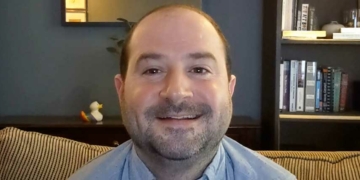“At the moment, the other side is winning. Before I die, I want to see a bit of a pushback.” This simple and heartfelt expression of an aspiration to challenge the woke identity politics culture that is currently assailing the West, stuck in my mind when I heard Frank Furedi, Emeritus Professor of Sociology at the University of Kent, speak at the recent launch of his new and highly topical book: “100 Years of Identity Crisis: Culture War Over Socialisation”. His latest work explores the history of social engineering that is “delegitimising the foundations of our culture”, where young people are being deliberately and systematically disconnected from the values, norms, and traditions of the past.
A prolific writer, and a political activist throughout his adult life, the many themes Furedi explores range from the sociology of anxiety, including the effects of anxious parenting, to the destruction of important physical, social, and moral boundaries.
Those of us alarmed at the attack by gender ideologues on fundamental child safeguarding will surely find strong resonance with Furedi’s diagnosis of this increasingly zealous modern attempt to reposition or dissolve important barriers separating the concepts of child and adult: an attempt made under the cover of non-judgmentalism, which is an absurd yet popular modern concept that expresses a lack of clarity about the importance of moral boundaries.
“The Left are denying that there is a culture war,” Furedi declared. “Denialism is a manipulative strategy. The media selects what you and I should be worried about.”
“No political party stands up for parents. The Conservatives are strong on rhetoric. The notion that the Government is fighting for free speech is all rhetoric.”
Furedi went on to assert that the administrative sector in government has become the de facto government in power, and that it enjoys more power than our democratically elected leaders, offering as an example the fact that woke civil servants, in order to promote their gender ideology indoctrination programme, had recently invited Stonewall UK into Government departments to offer “re-education” to staff without the knowledge or consent of the relevant ministers.
In November, Furedi penned a whole article on this topic that carried the heading, “The UK government has lost control of its woke civil service”.
Making reference to “alarming reports of the extent of the influence of the LGBT+ group Stonewall at government departments – seemingly without the knowledge of ministers,” his article begins with the question: “Who is actually running the British state?” While the civil service “is quietly getting on with the project of turning the British state into a woke cultural institution”, Furedi asks whether ineptitude or cowardice on the part of our political leaders has allowed this situation to arise.
No punches are pulled in his description of Stonewall as an “LGBTQ+ lobby group” that is “as woke as it gets”, that has an “illiberal reputation for advocating the policing of language and demanding the usage of pronouns”, and that is “busy re-engineering the culture of the civil service”. There will, no doubt, be a great deal of support for Prof Furedi’s views among the readership of this publication.
While the civil service “is quietly getting on with the project of turning the British state into a woke cultural institution”, Furedi asks whether ineptitude or cowardice on the part of our political leaders has allowed this situation to arise.
The fact that, in October, Nancy Kelley, CEO of Stonewall, was invited to a Foreign Office event without Foreign Secretary Liz Truss even knowing, indicates that “the practice of civil service accountability to ministers has become a relic of the past”.
In his article, Furedi notes that these attempts by civil servants to keep ministers in the dark about Stonewall’s activities are matched by the even more worrying phenomenon of some ministers clearly feeling indifference about who provides training and education to their civil servants, with the consequence that the British civil service is undergoing a programme of systematic “re-education” into the language, values, and practices of identity politics movements.
An example of this systematic re-education is the transgenderism that is “fast becoming institutionalised in the Ministry of Defence”, demonstrating “public sector bodies in thrall to Stonewall” and with MoD guidance slavishly following Stonewall’s instructions, such as with its declaration that “not all women are biologically female” and that the word “female” should be used with caution in case it “erases gender non-conforming people and members of the trans community”.
MoD staff are also expected to declare their preferred pronouns on email signatures, social media profiles, and at the beginning of meetings. Furedi notes the lack of objection to these measures from the MoD or the ministers in charge of it. In his book launch speech, Furedi referred to the Government as a “willing prisoner”.
It could well, he believes, bode ill for our nation’s defence when our military is re-educated by social engineers to assimilate the language and behaviour of university student activists.
Such is the degree of capture experienced by the American military establishment that Furedi regards them as being “far more invested in promoting the virtues of LGBTQ+ propaganda than in fighting the war in Afghanistan.” He asks: “Is that what the British people can expect of their own armed forces in future?”
Stonewall gets described as a “semi-official ‘Correctorate’”, empowered to dictate acceptable speech and the behaviour of public servants: an issue that has a serious bearing on our democracy.
Although he believes that the woke Left is currently winning the culture war, Furedi emphasised that there is still hope it can be stopped, and he referred to the recent gubernatorial election outcome in Virginia USA, where the Republican candidate, Glenn Youngkin, emerged victorious after making opposition to critical race theory and gender ideology in schools central to his campaign.
There are three factors, according to Furedi, that are essential for a successful fightback against colonisation by woke ideology.
The first factor is to give dissenters a voice and to empower the large number of people in our society who oppose extreme identity politics to speak out against it.
The second factor is to work at reaching young people of fifteen, sixteen and seventeen who still haven’t been indoctrinated into assimilating woke identity politics.
The third factor is to encourage people to find their courage.
Furedi warns against complacency. “Freedom is something you have to fight for,” he declared.
His analysis of wokeism included a reference to “technocratic progressivism”, which I assumed accurately defines the kind of behaviour Furedi described as characterising the UK civil service class. He also referred to “the cultural politics of identity” – otherwise known as “identity politics”, where the personal becomes the political.

Photo: DisobeyArt/iStock Getty Images
Woke ideology is being used by the media as the medium by which big business is establishing dominance, according to Furedi. When he offered this observation, my mind turned to the oppressive saturation to which citizens are regularly subjected during Pride Month by multinational companies, banks, and other institutions, with their Progress Pride flags, their rainbow and trans social media transformations, and their window posters. Of course, this religious imposition of LGBTQ+ gender ideology on customers only takes place in the West, where these companies and banks have an interest in doing so, and where doing so will cause them no financial detriment. This virtue-signalling is such a convenient distraction from whatever negative behaviours those companies and banks indulge in outside the domain of enforced gender ideology.
Needless to say, when I’ve looked at the social media accounts of the very same multinational companies and banks that they operate in those countries where homosexuality is illegal or deeply stigmatised, there is never a single Pride icon, rainbow flag, or word of Pride solidarity to be seen. The very places where the most downtrodden lesbian and gay people in the world urgently need multinational companies to openly support their rights, are places of corporate betrayal and double standards, where the profit motive can be seen to prevail ruthlessly: evidence enough that LGBTQ+ ideology is being used as a manipulative smokescreen by unethical and hypocritical corporations.
This parallel he draws between gender ideology and Puritanism, with both ideologies characterised by an attempt to colonise our inner lives and by a “lack of joy and smiles” in life, struck me as fascinatingly on-target.
While listening to Frank Furedi speak, and while reading his analysis of woke identity politics culture, a strong impression developed of a courageous and principled man, as well as an exceptional and inspirational intellectual, who has a uniquely accurate and original perception of how Western society has been captured by a toxic ideology and of what is now required in order to liberate it again. The uniqueness of Furedi’s insights was particularly evident during his book launch presentation when he offered some thoughts about the psychology of wokeism’s adherents.
For Frank Furedi, transgenderism and all wokeism resemble Puritanism in their joylessness and rejection of the sensual, and we must find our courage to resist this misery. This parallel he draws between gender ideology and Puritanism, with both ideologies characterised by an attempt to colonise our inner lives and by a “lack of joy and smiles” in life, struck me as fascinatingly on-target. It took my mind back to the 1980s, when the gay rights movement, and the gay community, took great interest in the sensual and the erotic, and when doing so felt liberating to self-repressed souls that had internalised so much guilt and anxiety in relation to forbidden sexual feelings. Furthermore, I recall that there was much camaraderie around, which included tolerance of different political opinions and an openness to humour, fun and friendship.
By contrast, it seems to me that today’s LGBTQ+ lobby has transformed itself into a grievance-obsessed pitchfork mob that is too consumed by anger, neuroticism, hatred, and victim-identity, to live in joy, empathy, and harmony with others. Indeed, today’s obsessive LGBTQ+ lobby focus seems to be on promoting legislative change that would lead to many lesbian and gay young people being put on a transgender medical pathway that will impair their adult capacity for sexual enjoyment, that may even lead to the amputation of their sexual organs, and that will encourage them to mistakenly believe and declare that they are heterosexual. When I compare the gay community of yesteryear with the grotesque LGBTQ+ gender lobby of today, I see a contrast in attitude towards embracing joy, self-acceptance, and an affirmation of the sensual, that could not be any starker.
This LGBTQ+ Puritan mob, or so it seems to me, will do all it can to destroy the lives of anyone who expresses any dissent from the dogmata fuelling its onward march of quasi-religious fundamentalist colonisation. In contrast to the very different kind of community I encountered as a young gay man, I do indeed now see Joyless Puritans of the Eternally Expanding Alphabet, spiritual slaves of identity politics, who like nothing more than to make everyone else as miserable as they are.
For Furedi, citizens need to be able to recognise one another as members of their shared cultural community: something that identity politics emphatically works against with its unyielding emphasis on difference and diversity, on perpetual victims and perpetual perpetrators, all at the expense of homogeneity.
He notes that, “In many areas of life now, the boundary between man and woman appears increasingly illegitimate,” and that where this boundary still exists, it is depicted as something that is artificial and even oppressive, with those who transgress this boundary “celebrated by the media as brave and inspirational role models”.
The most impressive article I have ever encountered on gender ideology was written by Frank Furedi. Entitled, “The trans assault on freedom: gender ideology is not about liberation – it is about coercion and control,” Furedi sets out a definition of the specific political objective of transgenderism as “the erosion of the significance of biological sex” which “is undermining long-held cultural assumptions about what it means to be a man or a woman”.
He describes transgenderism as “an intolerant, coercive force” that “has been thoroughly embraced by political and cultural elites in both the UK and the US”. It is “the new orthodoxy among members of the political class” that even some Conservatives are promoting.
His article demonstrates a very keen understanding of the dangers posed to women and children by gender ideology, and of the rapidity with which it is capturing institutions, businesses, and even respected scientific publications. He notes that, “In many areas of life now, the boundary between man and woman appears increasingly illegitimate,” and that where this boundary still exists, it is depicted as something that is artificial and even oppressive, with those who transgress this boundary “celebrated by the media as brave and inspirational role models”. Furedi responds to the coerced speech and lexical redefinitions imposed by gender ideologists and their allies with the reminder that, “As George Orwell warned, taking control of language and redefining the meaning of words is the first step taken by those seeking to control people’s thoughts.”
The article describes a serious threat to civil liberties by transgenderism, giving examples that include the situation in New York City, where an employer or landlord who intentionally addresses a non-binary-identified employee or tenant with the “wrong” pronoun can face fines of up to $250,000. He describes what is happening as thought control that “calls into question both freedom of expression and freedom of thought”. “This is an attempt to control the way people think. As Orwell put it in ‘Nineteen Eighty-Four’: ‘The Party told you to reject the evidence of your eyes and ears. It was their final, most essential command.’”
The trans activist movement demands what it regards as civil rights for those it claims to represent, while, Furedi observes, at the same time having no hesitation in undermining the rights of others, particularly in the domain of free speech.
A particularly unique and original contribution Furedi makes to the analysis of transgender ideology is that it constitutes an attack on “any form of thinking that involves drawing binary distinctions between things”. He describes this attack as especially dangerous insofar as the act of drawing binary distinctions, so that a discrimination can be made between phenomena in different categories, is indispensable to moral thought and the making of ethical judgements. It is the very act that enables us to distinguish between right and wrong, between good and evil.
Becoming estranged from their culture’s traditions and norms, children who adopt this ideology are tipped into an identity crisis, “messing up (their) lives and diminishing their capacity to make the transition to adulthood. It is a corrosive worldview that threatens the healthy development of younger generations.”
This devaluation of binary distinctions is therefore both an attack on reason and also on the ability to exercise moral judgement, and the rejection of binary categories constitutes a questioning of normality itself. Transgenderism also attacks the notions of normality and normativity as a threat to the trans identity: something that Furedi regards as endangering communal life, given that when concepts of normal and abnormal disappear, the capacity to distinguish between desirable and undesirable forms of behaviour disappear with them.
He regards the attack on binary thinking as motivated by an attempt to abolish moral judgement, and he regards the popular paradigm of non-judgmentalism as helping transgender ideology to prevail.

100 Years of Identity Crisis: Frank Furedi’s new book
Furedi demonstrates his awareness of the harm caused to women by transgender ideology, but he believes its damaging effect on children to be significantly greater, as it alienates children from their community’s values and norms and undermines their and their community’s understanding of what is normal and what is abnormal. Becoming estranged from their culture’s traditions and norms, children who adopt this ideology are tipped into an identity crisis, “messing up (their) lives and diminishing their capacity to make the transition to adulthood. It is a corrosive worldview that threatens the healthy development of younger generations.”
Furedi describes the “attempt to create a year zero history and to reject the past” as “irredeemably evil”, maintaining that, “if we lose our connection to our past, then we become a prisoner of the present”.
“Western society is in serious trouble” he states, and many people who oppose gender ideology as an attack on our free and tolerant society stay silent through fear. Furedi offers a stark warning that unless it is challenged, this gender authoritarianism will only become worse, “especially given the backing it receives from big business and elite foundations and trusts”. He is adamant that the future of society depends on our willingness to exercise our moral judgement and to challenge gender ideology. Buying into today’s popular paradigm of non-judgmentalism will produce a dire outcome.
While I listened to Frank Furedi at his book launch, I thought about the gender neo-Puritans continuing on their ideological march through our institutions, backed by commercial, social, and political elites, trampling underfoot the safeguarding of children, the sex-based rights of women and of gay people, the normal definitions of words, the concept of objective reality, the concept of moral judgement, our freedom of speech and civil liberties, our right to live in joy and harmony, and our right to defend important boundaries. It struck me that Furedi was right when he said the woke Left is currently winning, and also right when he warned we needed to try to stop them winning by finding our courage and speaking out, by urging others to do the same, and by offering young people alternative ways to interpret their reality and alternative ethics to live by.
To achieve all this, we need the help of exceptional original thinkers who will describe the terrain, point out the way, model courage, and journey with us on our path of resistance. I am convinced Frank Furedi is one of those exceptional people – a key philosopher of our movement who deserves close attention as we watch the West being pushed ever closer to the brink by infantile and sociopathic adults, and as we become increasingly aware of just how much is at stake.
Gary Powell is a gay man and has been active in gay politics since 1980. He is the Research Fellow for Sexual Orientation and Gender Identity at the Bow Group and the European Special Consultant to the Center for Bioethics and Culture.
























Comments
No comments yet, be the first to leave a comment.